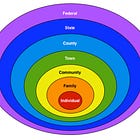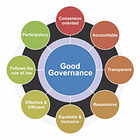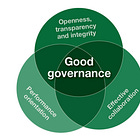Politicians, officials, and think tanks have been quietly repackaging creeping authoritarianism in glossy new terms — subsidiarity, regionalism, gradualism, target-based governance, ‘good governance’, stakeholder selection, and ethical governance. On paper, they promise care, inclusion, and morality.
But take a closer look and you’ll find that each one quietly chips away at democracy.
This is a summary of the recent Substack posts linked below.
Subsidiarity
‘Subsidiarity’ is a clever-sounding term meaning ‘decisions should be decentralised to the lowest appropriate authority’. On paper, it sounds democratic — local communities governing their own affairs, with higher powers stepping in only when strictly necessary. But in practice, subsidiarity is often little more than a bureaucratic illusion. There’s always a reason the local level is deemed ‘incapable’, conveniently triggering outside intervention. Authority drifts upward, leaving communities with the façade of control but none of the leverage. And the key question rarely gets asked: at what level, exactly, are we meant to ‘decentralise’ allegedly global issues like climate policy or biodiversity?
Regionalism
Regionalism sells itself as sensible cooperation — neighbouring areas or states working together under shared frameworks, bypassing the inefficiencies of isolated governance. It sounds pragmatic, even modern. But in practice, it just builds another opaque layer between you and the people making decisions. These so-called ‘regional councils’ are rarely elected by the public, yet they end up shaping policies that affect everyone. Accountability disappears into a fog of intergovernmental committees, where decisions are made behind closed doors by appointees, not representatives. And when something goes wrong, no one is to blame — it was ‘the region’, after all. Voters are quietly removed from the process along with accountability.
Gradualism
Gradualism is the art of change by stealth. It sells itself as caution — slow, deliberate reform backed by ‘facilitative science’. Who could object to a scientifically guided progress? But gradualism is primarily about cover. Small tweaks — new terms, soft regulations, pilot programmes — each seem harmless alone. But stitch them together over years, and you wake up in a different system. No moment felt dramatic, yet everything changed. By the time the shape of it emerges, it’s too late: the mechanisms are locked in, and no one takes responsibility. And when questioned, they’ll rightly say the decision was made long ago — and the courts just upheld it.
Target-Based Governance
Target-Based Governance parades itself as rational — who could oppose clear goals like cutting emissions or reducing poverty? But once numeric targets are set, they take on a life of their own. Suddenly, democracy is boxed in. Elected officials become little more than accountants, forced to meet benchmarks they never wrote — or lose funding. Debate no longer asks what should be done, only how to hit the target. And who sets these targets? A faceless clutch of experts behind closed doors, using synthetic, modelled data which cannot be called into question. The numbers become sacred; questioning them is heresy. Suggest we rethink a target, and you’re accused of sabotaging national progress. Bit by bit, policymaking becomes a computational model or a spreadsheet exercise — obedient to metrics, deaf to the public.
Good Governance
‘Good Governance’ is the banner under which nearly every reform now parades. It sounds harmless — who could object to transparency, accountability, or participation? But beneath this polished surface lies a toolkit of control. ‘Good governance’ isn’t defined by you, your neighbours, or even your elected representatives. It’s set by panels of experts, global think tanks, and international agencies who’ve already decided what counts as ‘ethical’. The result is a tick-box regime where governments are judged, nudged, and ultimately steered by scorecards written elsewhere. Politics becomes standardised, stripped of culture and context, and repackaged as technical compliance — soon to be computational, enforced by algorithms and AI. It’s governance without consent, bureaucracy without soul — a moralised checklist posing as democratic reform.
Stakeholder Selection
Stakeholder Selection is sold as a way to open up decision-making — giving a seat at the table to not just governments, but businesses, NGOs, academics, and community reps. Sounds inclusive, even democratic. But in practice, it’s just another filtering mechanism. Stakeholders aren’t chosen by the public — they’re selected by the same institutions that already hold the reins. And once chosen, they’re expected to ‘fit in’. Disagree too strongly with the stated objectives, and you’ll find yourself ‘iterated’ out in the next round of consultation. The process rewards alignment, not dissent. What emerges is a curated club of compliant actors, where participation means agreeing with the premise, and inclusion means echoing the agenda. The public may hear the word ‘stakeholder’ and think they’re being represented — but in truth, the door was shut long before they arrived.
Ethical Governance
Ethical Governance is the velvet glove over the iron fist. Framed as the next evolution of responsible leadership, it wraps policy in the language of morality, virtue, and sustainability. Who could oppose being ‘ethical’? But here’s the catch — ethics are no longer personal or cultural, but rather codified by distant committees, rolled out as universal truths, and enforced without consent. Once a policy is labelled ‘ethical’, disagreement is no longer just opposition — it’s moral failure. Debate becomes taboo, and the usual democratic contest of values is replaced with compliance to a predefined standard. These standards aren’t up for vote; they’re delivered from above, often by unelected technocrats. The result is a chilling transformation: political questions are rebranded as ethical imperatives, and dissent is recast as deviance, commonly followed by enforcement action leading to dismissal — or worse.
Inclusion
Inclusion promises that everyone — especially marginalised voices — will have a seat at the table. In practice, it’s often a stage-managed performance. Officials proudly advertise their ‘inclusive processes’, but these usually amount to tokenism: a few handpicked representatives from each group, carefully chosen not to rock the boat. Consultations stretch endlessly, collecting opinions like souvenirs, but the agenda never really shifts. And if your input challenges the script too directly? You’re ‘iterated’ out — quietly replaced by someone more aligned with the predetermined goal. The illusion of inclusion is maintained; genuine dissent is not.
Participation
Participation implies citizens are actively involved in decisions affecting them. It sounds appealing, but often it just means formal consultations (surveys, town halls, online forums) that create the illusion of involvement. Leaders hold ‘participatory sessions’ where the agenda is already framed, and ordinary people raise their voices only to see their feedback tweak minor details at best. By the time any policy is finalised, the major decisions were set by experts all along. In short, participation can become a managed dialogue, diluting real power into token feedback.
Cosmopolitanism & Global Citizenship
Cosmopolitanism and ‘global citizenship’ suggest we are not just citizens of one country, but members of a single worldwide community, carrying a universal moral code. It’s may appear a noble idea – caring about humanity as a whole – but in practice it blurs local democracy. If every issue is framed as a ‘global concern’, then local opinions become just one piece of a much larger puzzle. Leaders can argue that decisions must serve the ‘global interest’, shifting authority to international forums rather than local ballots. Ordinary concerns are dismissed as ‘narrow’, while distant experts claim to know what’s best for everyone. In short, thinking of ourselves as ‘global citizens’ makes it easy to impose solutions from above, sidestepping what the people in any one place actually want.
Pooling of Democracy
Pooling of Democracy is the idea that nations or institutions can ‘share’ their democratic processes to solve problems together. It’s sold as efficiency: a modern way to tackle big, borderless issues through collective decision-making. But what it really means is giving up national or local control and handing it to a shared body you didn’t elect, can’t influence, and probably don’t even know exists. Your vote no longer shapes policy — it just disappears into a pool with a thousand others, diluted to the point of irrelevance. Accountability gets spread so thin, it vanishes entirely. Decisions are further made ‘collectively’, which means no single person or group can be held responsible.
Interdependence
Interdependence is the banner under which your autonomy is quietly boxed up and shipped off. Yes, the world is connected — through trade, technology, and environmental systems. But when every challenge is declared ‘interdependent’, the effect isn’t collaboration, it’s control. Responsibility floats upward: no local authority can act alone, no nation can decide for itself, because someone, somewhere, might be ‘impacted’. And just like that, every issue becomes too big, too global, too delicate for ordinary people to weigh in. The solution? More international panels, more distant regulators, more experts telling you what’s for ‘the common good’. Disagree, and you’re not just wrong — you’re a dangerous reactionary, a far-right nationalist, a threat to our democracy. Interdependence doesn’t link us — it tethers us to decisions we never made, enforced from heights we can’t reach.
Liquid Democracy
Liquid Democracy is marketed as the sleek, modern fix to old-fashioned politics — a system where you vote directly on issues or hand your vote to someone you trust. Sounds empowering, right? In theory, you can delegate, revoke, or reassign your vote at any time. In practice, it’s a labyrinth. Votes pool into the hands of popular figures or influencers who quickly become power hubs without formal accountability. Behind the promise of agility and choice lies a fog of complexity, where your vote is buried under digital chains of delegation. Worse, the whole process tends to run on platforms designed and controlled by private actors or unelected bodies. You’re told you’re participating — but what you’re really doing is surrendering control to a system so convoluted, only technocrats and insiders can follow the path. Your power becomes not only diluted, but displaced, and democracy becomes a game of shadows.
Deliberative Democracy
Deliberative democracy claims to elevate public discourse by encouraging policy decisions only after thoughtful discussion among citizens. It sounds noble — a rational forum where people talk through disagreements and reach consensus. But in practice, it often becomes a curated performance. Participants are frequently selected to ensure ‘balance’, questions are carefully framed, and moderators steer the conversation to avoid unwanted conclusions. The wider public has no direct vote, and the final decision is usually made elsewhere. What gets presented as a product of reasoned consensus may simply be cherry-picked from the parts that align with pre-set agendas. It’s a contemporary revival of Plato’s philosopher kings — rule by the allegedly wise, selected not by the people, but for their perceived rationality. Dissent becomes ignorance, and consent is manufactured through polite, pre-managed dialogue. All the theatre of democracy — without the risk of real opposition.
Decision-Making vs Decision-Taking
In bureaucratic language, ‘decision-making’ refers to the process of discussion, consultation, and advice — the part where everyone gets to talk. ‘Decision-taking’, on the other hand, is the moment of final approval — the part that actually matters. This distinction may seem like semantics, but it’s a critical sleight of hand. While ordinary people, civil society, and even local officials are invited to ‘participate’ in decision-making, the real power lies in decision-taking, which is typically reserved for higher authorities, senior bureaucrats, or unelected technocrats. Worse still, even when a lower body makes a decision, someone higher up the chain can override it — meaning that true authority always flows upward. This structure creates the illusion of inclusion while ensuring central control remains untouched. It’s a linguistic trick that masks the top-down nature of modern governance, allowing elites to claim democratic legitimacy while holding a veto over anything that strays from the approved path.
The Big Picture
Every single one of these terms — subsidiarity, good governance, stakeholder inclusion, and so on — wears a mask of democratic virtue. They promise inclusion, participation, and fairness. But taken together, they don’t extend democracy — they slowly extract it. Instead of authority flowing from the people to their representatives, it is siphoned upward through target frameworks, expert panels, and soft-law ethics, where decisions are shaped long before any public input is considered. Citizens are shuffled through an endless circuit of consultations, workshops, and feedback sessions, only to discover that the outcome was already written. Reports cite their ‘values’, yet those values are pre-framed, curated, and stripped of force.
This isn’t democracy upgraded — it’s authoritarianism rebranded. A shiny coat of ethical language and participatory slogans hides a system now dominated by technocrats, NGOs, and expert networks you never elected. Power doesn’t disappear — it just relocates. Not seized by force, but transferred through abstraction, jargon, and soft governance mechanisms that bypass the ballot entirely. Decisions become so fragmented and remote that accountability vanishes. What remains is managerial rule dressed in moral terms — polite, procedural, and… profoundly undemocratic. It doesn’t command; it quietly disincentivises dissent. And by the time you notice what’s missing, your voice is no longer part of the process.
And that’s the trick — it all sounds reasonable, even progressive, until you realise the one person no longer involved in governing is you.












The other end of this coin is the madness of not having proof of citizenship to be able to vote as if minorities or chosen ones are too stupid or ignorant to get an ID. They feed us loads as if we are in a barnyard waiting for our next meal. The old phrase, they got you coming and going, that is today's modern western governments, where leaders hate their own citizens, cheer on the invasion, and treat us, when we bark, as needing to be put in the kennel for reprogramming. So easy to see, but so many seem to not care and would rather be entertained than make sure humanity will not fade away into transhumanism, we have been warned, wake up western world you are under attack.